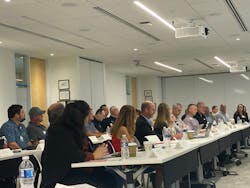PLASTICS: Operation Clean Sweep grows larger and stronger
Operation Clean Sweep (OCS) is an initiative founded by PLASTICS to empower companies committed to zero resin loss in operations and provide those companies with resources to support secure management of plastic resin. In a major milestone, OCS recently logged its 1,000th facility to have undertaken the OCS pledge of working toward zero resin loss.
The industry-led program, operated by PLASTICS in partnership with the American Chemistry Council’s (ACC) Plastics Division, has two tiers of membership. At the OCS level, companies designate certain of their facilities to operate under OCS guidelines, including conducting internal audits and training employees. At the OCSblue level, companies commit not only to working towards zero resin loss, but to onboarding all resin-handling facilities in their portfolio and report data annually.
OCSblue members met in Houston on November 2nd of last year, to chart the program’s expansion through 2023 and beyond. More than 40 attendees from 25 OCSblue companies joined the conversation, hosted by PLASTICS and OCSblue member SABIC at their Houston offices.
As PLASTICS’ Vice President of Sustainability, Patrick Krieger, shared in his opening remarks, more than 47 companies with 514 facilities have joined OCSblue, demonstrating their leadership in mitigating plastic waste in the environment. Indeed, OCSblue membership has surged, with the program growing more than four-fold since 2018.
Members educating members
Brittany Darras, senior sustainability manager at Braskem, kicked off a discussion around partnering with logistics providers and underscored the critical need for strong relationships with those moving resin by truck, rail or sea.
Pivoting to the topic of going beyond remediation for released material and ensuring that spilled resin is recycled, Petroleum Service Corporation (PSC) Group Vice President of Sustainability Chris Lendo shared his thinking on how companies can institute thoughtful collection to ensure circularity.
Lastly, ExxonMobil Environmental Advisor John Faber explored how material suppliers and processors can engage directly with the wastewater community, informed by his involvement in the Water Environment Federation’s Industrial Wastewater Committee.
Opportunities for growth
In addition to these areas of increased interest, attendees unpacked additional key priority areas including third-party verification, data reporting, common industry practice sharing and international harmonization. Not only has OCS expanded within the U.S., it has proliferated to more than 65 countries. Charlotte Dreizen, PLASTICS’ director of sustainability and environment, walked through possible approaches that would forge closer ties among international programs, not only cross-pollinating successful strategies but streamlining experiences for multinational companies managing facilities globally across numerous jurisdictions.
Inspection of resin management protocols is another area where international OCS programs have excelled, most notably in Canada and Europe. David Sandidge, consultant for OCS, shed light on how the OCSblue program in the U.S. can strengthen its internal audit requirement by developing a third-party verification program in which member company facilities can bring in inspectors to perform an OCS audit alongside inspections for ISO 14001, among other protocols. Moreover, Sandidge shared success stories and lessons learned from three initial pilots executed in 2022 with OCSblue material suppliers, each with a distinct audit service provider.
Planning for the future
PLASTICS’ Sustainability and Materials Manager, Heather Nortz, continued the growth conversation with a discussion of new education opportunities, resources and collaboration platforms OCSblue members have identified as critical to equipping companies to achieve zero resin loss. Brad Sparks, SABIC Senior Manager for Sustainability Strategy in the Americas, explained how OCS can represent a central piece of broader ESG, materiality and circular economy strategy.
Over the course of the gathering, OCSblue members affirmed their commitment to achieving zero resin loss in operations. As OCS continues to drive its member-led, member-driven program forward, companies that make, use or move resin are welcome to reach out at [email protected] to learn how they can join the community of companies leading responsible management of plastic resin.
And while Operation Clean Sweep is focused on operational practices, it is equally important to consider the equipment that is being used in these facilities. Equipment should be designed to limit spills by ensuring controlled loading and release of plastic resin, for example, or facilitate the cleaning up of spills through such options as ensuring sufficient open space. This is an area of learning that the program has not yet considered, so if you would like to share information about how your equipment reduces spills, or helps prevent or clean up spills, [email protected] is the place for you to reach out, as well.
About the Author
Plastics Industry Association (PLASTICS)
The Plastics Industry Association (PLASTICS) is a purpose-driven organization that supports the entire plastics supply chain. Learn more at plasticsindustry.org/about-plastics/
